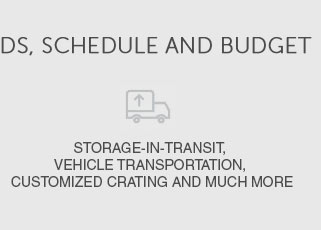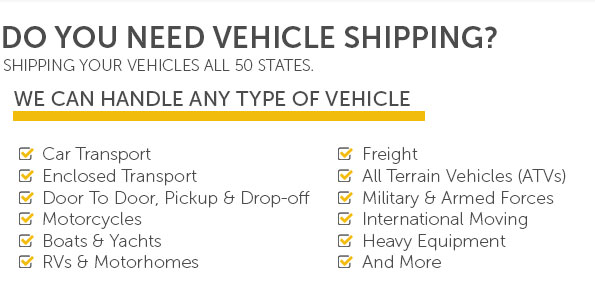 |
 |
 |
||
 |
 |
 |
 |
||
 |
 |
 |
 |
 |
 |
 |
 |
 |
 |
Shipping Your Car Cross Country: A Complete Beginner’s GuideIn today’s fast-paced world, the idea of shipping your car across the country may seem daunting at first. However, with the right information and preparation, it can be a straightforward process that ensures your vehicle reaches its destination safely and efficiently. In this guide, we'll explore the essential aspects of car shipping, providing valuable insights for those venturing into this endeavor for the first time. Whether you’re relocating for work, purchasing a vehicle from a distant dealership, or simply embarking on an extended vacation, understanding the nuances of cross-country car shipping can save you time, money, and stress. The key is to approach this task with a well-rounded understanding of the available options, associated costs, and potential challenges. Understanding Your Options When it comes to shipping your car, you have several options to consider, each with its own advantages. The most common methods include open transport and enclosed transport. Open transport, the more economical option, involves transporting vehicles on an open carrier. Although your car is exposed to the elements, this method is highly popular due to its affordability and efficiency. On the other hand, enclosed transport offers enhanced protection, shielding your car from weather and road debris, making it ideal for luxury, classic, or high-value vehicles. Cost Considerations The cost of shipping your car cross-country can vary significantly based on several factors, including distance, vehicle size, and transport method. Generally, open transport is less expensive than enclosed transport. Additional considerations such as seasonal demand and fuel prices can also influence pricing. To ensure you receive a fair rate, it’s advisable to obtain quotes from multiple reputable shipping companies, comparing their services and reviews. Preparing Your Vehicle Before handing over your keys, it’s essential to prepare your vehicle for transport. Start by cleaning your car thoroughly, both inside and out, to facilitate an accurate inspection. Remove personal belongings to avoid potential damage or loss. Additionally, check for any existing damage and document it with photos. Ensure your vehicle is in good working condition by checking the battery, tire pressure, and fluid levels. These steps will help prevent any unforeseen issues during transit. Choosing a Reliable Shipping Company With countless companies offering car shipping services, selecting the right one can be challenging. Prioritize companies with strong reputations, positive customer reviews, and appropriate licensing and insurance. A reliable company should provide transparent pricing, clear communication, and excellent customer service. Don’t hesitate to ask questions and clarify any doubts before committing to a contract. Understanding the Shipping Process Once you’ve chosen a shipping company, you’ll need to familiarize yourself with the shipping process. Typically, the company will schedule a pickup date, during which an inspection report will be completed. This document is crucial for recording your vehicle’s condition before transport. During transit, you can expect updates on your vehicle’s progress. Upon delivery, a final inspection will take place to ensure your car arrives in the same condition as when it was shipped. Subtle Opinions and Insights While the logistics of shipping your car may seem overwhelming, the benefits often outweigh the challenges. Shipping your car can save you the time and wear associated with long-distance driving. Moreover, the peace of mind knowing your vehicle is in professional hands allows you to focus on other aspects of your move or trip. In the end, choosing the right shipping method and company can make all the difference in ensuring a smooth, stress-free experience. FAQsHow long does it take to ship a car cross-country? The duration of shipping a car cross-country typically ranges from one to two weeks, depending on the distance, route, and any unforeseen delays. Is it safe to ship my car? Yes, shipping your car is generally safe, especially when using a reputable company with proper insurance and experienced drivers. What should I do if my car is damaged during shipping? In the event of damage, document it thoroughly and contact the shipping company immediately to initiate an insurance claim. Can I pack personal items in my car during shipping? Most shipping companies advise against packing personal items in your car, as they are not covered by insurance and can pose a risk of theft or damage. Do I need to be present for the pickup and delivery of my car? While it is preferable to be present, you can authorize a representative to handle the pickup and delivery, provided they have the necessary documentation. https://www.reddit.com/r/projectcar/comments/1191wan/shipping_car_cross_country_requesting_advice_on/
If you're shipping long-haul (2000-3000 miles), carrier's rates should range from about $0.35 to $0.45 per mile, but more is always better for them. https://www.montway.com/ship-car-across-country
Cross country vehicle shipping is a type of service provided to move cars state to state or city to city. Auto transport haulers travel about 500-700 miles/day ... https://www.uship.com/vehicles/shipping-cars-across-country/
As a rough guide, you can expect shipping a car across the US to cost around $0.94 per mile for 1000+ miles. Distances of less than 1000 miles will cost around ...
|